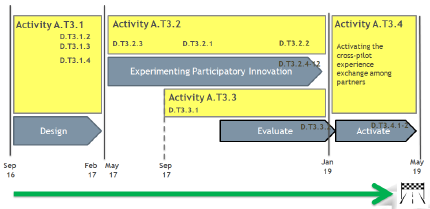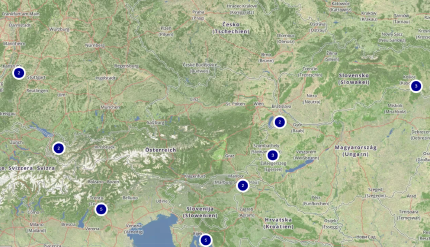Implementing and evaluating (Smart) participatory methods in urban innovation processes (pilots)
Innovative solutions in urban environments has been developed in close cooperation with end-users (citizens-customers from the civil society) and private sector (investors and businesses) to make them operational and viable. To do this, participatory methods and tools, developed by the WP T2 included in the toolbox, has been tested in different scenarios through 9 pilots actions and the results obtained has driven toolbox improvement and adaptation.
Many novel “smart” digital solutions, products, technologies and services are not yet broadly adopted for various reasons like lack of knowledge or involvement in the designing phase, motivation or recognition of end-users. URBAN INNO project is assuming that real successfully “innovative” solutions, in particular in urban environments, must be developed in close cooperation with typical end–users (citizens, customers) and private sector (investors, small businesses) to make these developed solutions ready to have a real impact. This is why the URBAN INNO key point is about the involvement of citizens and civil society in the innovation process by applying the participatory/co-creation toolbox developed and made available through the project. This toolbox, tested by the partners involved through the 9 pilot actions, is composed by tools and techniques designed for the engagement of citizens and other relevant local stakeholders in the urban innovation process.

URBAN INNO has involved civil society in the innovation process
WPT3 activities could be described in 4 macro activities, here after described:
PHASE 1 - from September 2016 to February 2017
Definition in each regions of a pilot project and the planned roadmap for its implementation. Pilots are clustered by market fields: mobility (Vorarlberg), energy (Karlsruhe, Pinkafeld/Hartberg), smart city and smart users/innovative governance (Trento and Maribor), agriculture (Kosice), integrated public infrastructures (Rijeka), SMEs economic growth (Kielce, Vas County)
PHASE 2 – from May 2017 to December 2018
The Pilots implementation phase, including at least 2 innovative participatory methods for each pilot action, with adaptation to peculiar local requirements and adaptation (number of events, participants, target groups, target results and many more) . A map of the pilot actions is available here.
PHASE 3 – from End of 2017 to December 2018
The In-line evaluation of the pilot results to guarantee a successful pilot implementation and learning process by all partners. The evaluation methodology has been developed in a dedicated workshop in October 2017 in Rijeka.
PHASE 4 – from Jan 2019 to end
Activation of the cross-pilot experience exchange among partners, based on the single evaluations made, that leaded to a transnational analysis (i.e. URBAN INNO lessons learned) and the final tuning of the toolbox. A specific workshop about this has been made in Vorarlberg in May 2018.

URBAN INNO Pilot Actions timeline

The URBAN INNO Pilot actions on the Central Europe territory
URBAN INNO pilots:
